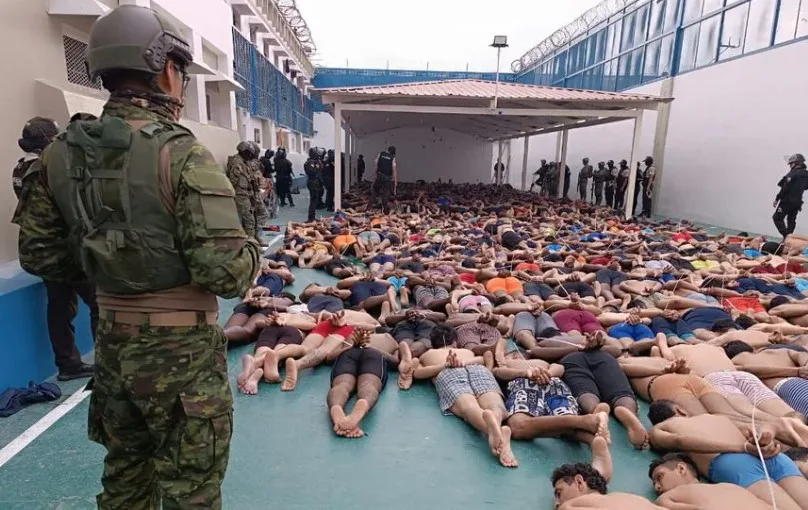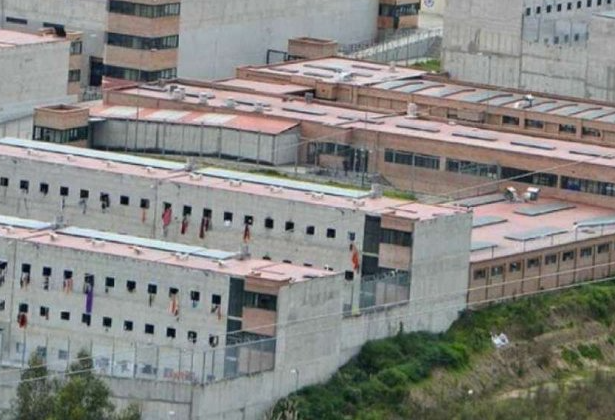Prison ships or the ‘Bukele model’? Ecuador’s plan to improve and control its prisons is adrift

The Ecuadorian Army in an intervention at the Litoral Penitentiary in Guayaquil.
By Carolina Mella
President Daniel Noboa made a campaign promise to purchase prison ships to house the leaders of the gangs that operate in the country’s penitentiaries 80 miles off Ecuador’s Pacific coast. Delivering on that promise, he now says that he has seen  three barges that could reach Ecuador within seven or eight months. Although this security measure received the most attention during his campaign, the president now recognizes that it is not the solution to the serious situation in which the country finds itself. “They are a complementary and provisional measure to segment and remove prisoners who are real threats to the public and national security and keep them isolated until the maximum and super maximum-security prisons are completed,” Noboa said at the beginning of December. Just a few days later, he announced that, in January, construction will begin on two maximum and super maximum-security prisons like the ones Nayib Bukele has built in El Salvador.
three barges that could reach Ecuador within seven or eight months. Although this security measure received the most attention during his campaign, the president now recognizes that it is not the solution to the serious situation in which the country finds itself. “They are a complementary and provisional measure to segment and remove prisoners who are real threats to the public and national security and keep them isolated until the maximum and super maximum-security prisons are completed,” Noboa said at the beginning of December. Just a few days later, he announced that, in January, construction will begin on two maximum and super maximum-security prisons like the ones Nayib Bukele has built in El Salvador.
Two months after Noboa came to power, with historic levels of criminality reaching 40 homicides per 100,000 of the population, the security and penitentiary policy he called Plan Phoenix has been revealed in dribs and drabs, through the few interviews that the president has given to various media outlets. Since December 11, EL PAÍS has been requesting an interview with a representative of the country’s Ministry of Interior, which has not yet been granted.

The Turi Penitentiary, located south of Cuenca, has been the scene of several deadly riots since 2021.
Part of the security strategies that the last three governments have promised without success is that the state would take control of the prisons, where 31,300 people are imprisoned. Until now, it has not been possible to break the direct link between prisons and the violence on the streets that is getting worse with each new day. From inside the prisons, criminal gang leaders direct and order hitmen, plan attacks and extortions, and move the logistics for drug trafficking. This is all done under the protection of the state, which is responsible for the country’s penitentiaries and that are guarded by the police, the military, and civilians. An example of this is the assassination of the former presidential candidate, Fernando Villavicencio, which was ordered from the Cotopaxi prison, according to the first investigations by the police. An order was also issued from the Litoral Penitentiary to carry out a wave of simultaneous bomb attacks that caused 24 hours of terror in Guayaquil in November 2022.
Strings can be pulled from the penitentiaries so that corrupt judges and prosecutors rule in favor of prisoners seeking benefits such as choosing the prison where they want to be incarcerated, a gym, bringing in drugs, weapons, communication equipment, and even fighting cocks.
The country’s recent Operation Metastasis sweep that saw the arrests of dozens of allegedly corrupt judges, prison officials and police might make a difference in the situation, but that remains to be seen.
According to the government, the purpose of the prison barges is to separate the incarcerated criminal gang leaders and isolate them from any communication that they are currently using freely from inside the country’s prisons. The prison ships that the Noboa government has seen have the capacity to house up to 400 people and would cost about $8 million. “A barge can arrive in seven or eight months, depending on how far away it is. Many of the barges are not operational or are not autonomous, so they have to be towed by another ship,” the president explained. He also pointed out that they were from Australia, the United Kingdom, and another that is in the United States.
For security analyst Luis Carlos Córdova, the announcement to bring barge prisons “is another band aid to fix the country’s serious insecurity problem.” The Noboa government, he says, “has no clear idea of how to put into practice many of the ideas that it came up with during the campaign.” Furthermore, for these prisons to operate, legal changes should be made, such as “creating a system of permanent state of exception, which is exactly what El Salvador has with the Bukele model, and which has allowed all types of human rights guarantees to be violated for those who are detained,” explains Córdova.
But before the barges arrive, two maximum and super maximum-security prisons are supposed to be ready, like the Terrorism Confinement Center mega-prison inaugurated by the president of El Salvador, Nayib Bukele, in February 2023. “We have already finished the conversations with international groups that built the prisons in El Salvador and Mexico, and we will start construction on those prisons in January,” said Noboa in one of his last interventions. The first two prisons should be in place in 200 days maximum, according to the government’s schedule, without specifying how much they will cost or where they will be built.
Minister of the Interior Mónica Palencia gave other details on the Ecuavisa television channel of what those two prisons would be like, which she stated would have “super-mega security” in terms of technology, although not necessarily in size. The technical standard, according to Palencia, establishes that a super maximum-security prison cannot hold more than 35 people. “We are going to have two specific prisons and other maximum-security prisons,” she added. It will be the same as those in El Salvador because the government has ensured that it will be “the same people, the same designers, the same company.” “It is Israeli cooperation in the design of maximum and supermax prisons and the segmentation for minor crimes and misdemeanors. It is a system that was not invented by Bukele, but came from Mexico, and before then it was already in use in Thailand and Singapore. Then came Mexico, El Salvador, and now Ecuador will have it,” said Noboa.
Ecuador already has a maximum-security prison called La Roca, which is within the Litoral Penitentiary complex in Guayaquil. It remained closed for six years and was renovated in 2022 to keep criminal gang leaders isolated. The problem, therefore, is not only one of infrastructure, but of how organized crime is embedded in the judicial system. The evidence of this was how José Adolfo Macías Villamar, alias Fito, from Los Choneros criminal gang, who was transferred to La Roca. He was not there for more than a month because a judge ordered that he be returned to his stronghold, the Regional prison, where he has remained with privileges for 10 years of incarceration.
“The main challenge is to stop the enormous degree of involvement of criminality in state institutions,” says Córdova, “today we know from the Prosecutor’s Office that there are police generals working for different criminal gangs and it would be very naive on the part of the government to believe that they can solve the problem with more prisons, when they should first create a policy that reviews the internal control mechanisms,” he adds.
Ecuador has a total of 20 prisons, housing 31,300 people. Their capacity, however, is for 27,500, which means that there is 13% overcrowding. Another of the government’s goals is to reduce overcrowding. Noboa said that 1,000 foreigners who are detained with sentences in prisons qualify for immediate deportation from the country.
“If one of the underlying problems is overcrowding, building two super prisons for 35 people each, how does it solve the problem?” Fernando Bastidas of the Permanent Committee for the Defense of Human Rights (CPDH) asks, adding that it is an anti-technical decision because if the government hope to lock up the ringleaders in those prisons, “in the logic of organized crime it has been proven that once they arrest one leader, ten more appear [to take their place].”
But the secrecy surrounding the government’s security plan has deepened the uncertainty of whether violence will be controlled in the country where businesses must pay extortion to operate, where classes are interrupted by shootings, and where there are 21 serious crimes every day.
_________________
Credit: El Pais




















